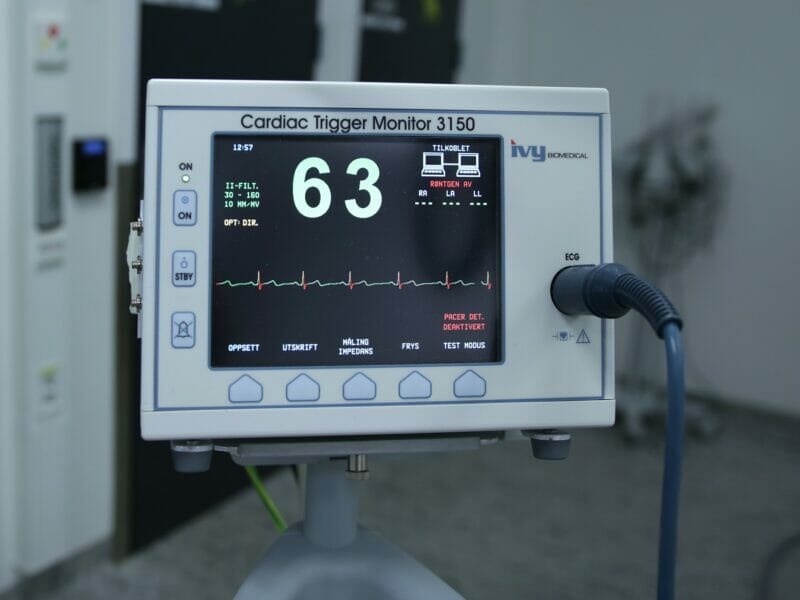The human body is a complex system where different organs and processes work together to maintain optimal health. In recent years, there has been a growing interest in understanding the role of neurotransmitters in various physiological functions. One such neurotransmitter that has caught the attention of researchers is gamma-aminobutyric acid (GABA). While primarily known for its role in regulating brain function, emerging evidence suggests that GABA also plays a crucial role in cardiovascular health. This article will delve into the fascinating world of GABA and explore how it impacts our heart health, providing invaluable insights into potential therapeutic approaches for managing cardiovascular conditions.
The Physiology of GABA in Cardiovascular Health
Gamma-aminobutyric acid (GABA) is a neurotransmitter that not only regulates brain function but also exerts significant effects on cardiovascular health. GABA acts as an inhibitory neurotransmitter in the central nervous system, counteracting excitatory signals and helping to maintain overall balance. Growing evidence suggests that GABA also plays a crucial role in regulating blood pressure and heart rate.
 Studies have shown that GABA receptors are present in various regions of the cardiovascular system, including the heart, blood vessels, and kidneys. Activation of these receptors by GABA can promote vasodilation, leading to lower blood pressure levels. Additionally, GABA has been found to regulate sympathetic nerve activity, reducing cardiac output and heart rate under certain conditions.
Studies have shown that GABA receptors are present in various regions of the cardiovascular system, including the heart, blood vessels, and kidneys. Activation of these receptors by GABA can promote vasodilation, leading to lower blood pressure levels. Additionally, GABA has been found to regulate sympathetic nerve activity, reducing cardiac output and heart rate under certain conditions.
Emerging research indicates that disruptions in the GABAergic signaling pathway may contribute to pathologies such as hypertension or cardiac arrhythmias. Understanding the physiological role of GABA in maintaining cardiovascular homeostasis could potentially lead to novel therapeutic strategies for managing cardiovascular diseases in the future.
GABA Receptors and their Role in Cardiovascular Function
GABA receptors are a type of neurotransmitter receptor found in both the central nervous system and peripheral tissues, including the cardiovascular system. These receptors bind to gamma-aminobutyric acid (GABA), a chemical messenger that helps to regulate neuronal excitability. In the context of cardiovascular function, GABA receptors have been shown to play a role in blood pressure regulation and cardiac contractility.
Activation of GABA receptors has been found to result in vasodilation, or widening of blood vessels, which can help to lower blood pressure. This is thought to occur through several mechanisms, including modulation of sympathetic nerve activity and nitric oxide production. Additionally, activation of GABA receptors in cardiac tissue has been shown to reduce cardiac contractility, leading to decreased heart rate and myocardial oxygen consumption.
Overall, the presence and activity of GABA receptors in the cardiovascular system highlight their importance in maintaining normal physiological function. Dysregulation of these receptors may contribute to conditions such as hypertension and heart failure. Further research into understanding the precise mechanisms by which GABA influences cardiovascular health could potentially lead to new therapeutic strategies for managing these diseases.
GABA and Blood Pressure Regulation
The neurotransmitter gamma-aminobutyric acid (GABA) is primarily associated with its role in regulating brain function. However, recent studies have shed light on the importance of GABA in cardiovascular health as well. GABA acts within the central nervous system to influence blood pressure regulation through various mechanisms. It has been found that GABA can modulate sympathetic nerve activity and decrease the release of stress hormones, ultimately leading to a reduction in blood pressure levels.
One mechanism by which GABA regulates blood pressure is through its interaction with different receptors located within the cardiovascular system. By activating certain subtypes of the GABAA receptor, GABA can induce vasodilation and inhibit vascular smooth muscle contraction, resulting in lower blood pressure levels. Additionally, research suggests that deficiencies or dysfunctions in key components involved in producing or transmitting GABA signals may contribute to hypertension and other cardiovascular diseases.
Understanding the role of GABA in maintaining optimal cardiovascular health not only expands our knowledge on neurotransmitter functions but also opens up potential therapeutic opportunities for managing hypertension and related conditions. Further research into this fascinating area could potentially uncover new treatments targeting the modulation of GABA systems for improved blood pressure regulation and overall cardiovascular well-being.
GABA and Heart Rate Variability
GABA, short for gamma-aminobutyric acid, is a neurotransmitter primarily associated with regulating brain function. However, recent research suggests that GABA also has an important role in maintaining cardiovascular health.

Studies have found that GABA can lower heart rate and blood pressure by modulating the activity of certain receptors in the heart and blood vessels. This modulation helps to promote relaxation and reduce stress, ultimately leading to improved heart rate variability.
Heart rate variability (HRV) refers to the variation in time intervals between successive heartbeats.
It is considered an indicator of autonomic nervous system activity, reflecting the balance between sympathetic (fight-or-flight) and parasympathetic (rest-and-digest) branches of the nervous system.
Research has shown that higher HRV is associated with better cardiovascular health and overall well-being. GABA appears to influence HRV by enhancing parasympathetic activity and reducing sympathetic dominance. By promoting this balanced autonomic regulation, GABA may contribute to maintaining a healthy heart rhythm and improving cardiovascular function.
In summary, while initially known for its role in brain function, emerging evidence suggests that GABA also plays a vital role in cardiovascular health. Through its ability to regulate heart rate variability by modulating specific receptors within the heart and blood vessels, GABA contributes to relaxation and reduced stress levels which are crucial for optimal cardiovascular functioning.
GABAergic Signaling in Vascular Smooth Muscle
GABAergic signaling in vascular smooth muscle refers to the transmission of signals mediated by gamma-aminobutyric acid (GABA) within the smooth muscles that line blood vessels. GABA is primarily known for its inhibitory effects on neuronal activity in the central nervous system, but it has also been found to play a notable role in regulating vascular tone and blood pressure.
Studies have shown that GABA acts as a vasodilator, meaning it relaxes the smooth muscles surrounding blood vessels, leading to an increase in vessel diameter and improved blood flow. This effect is achieved through the binding of GABA to specific receptors, called GABAA receptors, present on the surface of vascular smooth muscle cells. Activation of these receptors leads to an influx of chloride ions into the cell, causing hyperpolarization and subsequent relaxation of the muscle.
Furthermore, alterations in GABAergic signaling have been implicated in various cardiovascular diseases such as hypertension and endothelial dysfunction. Dysregulation of GABAA receptor expression or function can lead to abnormalities in vascular tone control and contribute to pathological changes within blood vessels. Therefore, understanding the intricate balance between GABAergic signaling and vascular health may provide novel therapeutic targets for treating cardiovascular conditions.
In conclusion, while initially renowned for its role in brain function regulation, emerging research suggests that GABA plays a crucial part in cardiovascular health through its action on vascular smooth muscles. Understanding how this neurotransmitter impacts our circulatory system may pave the way for new therapeutic strategies aimed at improving overall cardiac wellbeing.

The Impact of GABA on Atherosclerosis and Cardiovascular Diseases
The impact of GABA on atherosclerosis and cardiovascular diseases has sparked significant interest among researchers. Traditionally recognized for its role in regulating brain function, emerging evidence suggests that GABA also plays a crucial part in maintaining cardiovascular health. Atherosclerosis, the buildup of plaques in artery walls, is a key contributor to several cardiovascular conditions like heart disease and stroke. Studies have shown that GABA receptors are present not only in the brain but also within blood vessels. This indicates that GABA may be involved in processes relevant to plaque development and progression.
Research has suggested that manipulating GABA levels could potentially influence the pathogenesis of atherosclerosis by altering inflammation, oxidative stress, lipid metabolism, and smooth muscle cell proliferation. Furthermore, studies using mouse models have demonstrated the beneficial effects of certain drugs acting on GABA receptors on reducing plaque size and improving vascular function. While more research is needed to fully understand the mechanisms underlying this relationship between GABA and cardiovascular health, these findings highlight its potential as an important therapeutic target for prevention or treatment of atherosclerotic conditions.
Therapeutic Potential of GABA for Cardiovascular Health
Gamma-aminobutyric acid (GABA) is a neurotransmitter that has garnered attention for its potential therapeutic benefits in cardiovascular health. Traditionally recognized for its role in brain function, recent research suggests that GABA also influences the cardiovascular system. It has been found to regulate blood pressure by reducing sympathetic nerve activity and promoting smooth muscle relaxation within blood vessels. Furthermore, GABA’s ability to inhibit the release of stress hormones contributes to its potential anti-hypertensive effects.
Studies have shown promising outcomes regarding GABA’s impact on various aspects of cardiovascular health. For instance, supplementation with GABA has been associated with reduced arterial stiffness and improved endothelial function – important factors in maintaining overall heart health and preventing conditions such as hypertension and atherosclerosis. Moreover, researchers believe that targeted modulation of the GABAergic system may provide new avenues for treating cardiac arrhythmias, further highlighting its therapeutic potential in this field.
In conclusion, gamma-aminobutyric acid (GABA) holds significant promise as an adjunctive therapy or preventive measure for cardiovascular health due to its involvement in regulating blood pressure and exerting beneficial effects on vascular function. Further exploration of this fascinating neurotransmitter’s mechanisms of action may uncover novel treatment strategies against common heart diseases such as hypertension and arrhythmias.
Conclusion:
Gamma-aminobutyric acid (GABA) plays a crucial role in cardiovascular health, as confirmed by a variety of studies. The primary inhibitory neurotransmitter in the central nervous system, GABA is a key participant in cardiovascular regulation.

Research conducted on rats, particularly spontaneously hypertensive rats, reveal that changes in GABA activity within the nucleus tractus solitarii (NTS) – an area of the brain involved in cardiovascular reflexes – may impact arterial pressure and heart rate. GABA injection into this nucleus led to marked pressor responses and increases in heart rate.
GABA’s influence on cardiovascular response is primarily exhibited through its impact on neurons in the NTS and ventrolateral medulla. Its actions are likely mediated by its synaptic inhibition capabilities which control the activity of baroreceptor neurons, ultimately regulating cardiovascular response to blood pressure changes.
On the contrary, GABA antagonists and reduction in GABA synthesis displayed an opposite effect, underscoring the importance of GABA in cardiovascular reflex function. It is also indicated that GABA transporter blockade and exogenous GABA can potentially reduce blood pressure.
Importantly, both the inhibitory and excitatory synaptic impacts of GABA in the NTS and other related regions are likely to influence cardiovascular function. The findings emphasize the importance of GABA in maintaining cardiovascular health and the potential implications of its dysfunction on heart rate and blood pressure regulation.
Therefore, the study of GABA, its receptor-mediated inhibition, and its release patterns offer intriguing insights into potential strategies to manage cardiovascular health and related disorders.
FAQs:
Q: What is GABA and why is it important in cardiovascular health?
A: GABA, or γ-aminobutyric acid, is an amino acid that serves as an inhibitory neurotransmitter in the central nervous system. It plays a crucial role in regulating the activity of neurons, including those involved in cardiovascular function. GABA has been found to have significant effects on blood pressure variability, resting heart rate, and other cardiovascular parameters.
Q: How is the release of GABA regulated in the body?
A: The release of GABA is tightly regulated by various mechanisms in the body. GABA release can be influenced by factors such as the activation of GABA receptors, the presence of certain agonists or antagonists, and the regulation of GABA-producing neurons. The exact mechanisms involved in the regulation of GABA release are still being studied and understood.
Q: Can GABA be injected directly into the body?
A: Yes, GABA can be injected directly into the body. In research studies, GABA injections are often used to study the effects of GABA on cardiovascular function and other physiological processes. These injections are usually administered to animals that have been anesthetized to facilitate the research procedures.
Q: What are some previous findings related to GABA and cardiovascular health?
A: Previous studies have reported that GABA receptor-mediated inhibition in the central nucleus of the amygdala plays a role in the regulation of cardiovascular and behavioral responses. Reduced GABA activity in this brain region has been associated with cardiovascular changes, including increased blood pressure and heart rate. These findings suggest that GABA plays a crucial role in maintaining cardiovascular health.
Q: How is GABA’s role in cardiovascular health studied in research experiments?
A: In research experiments, the effects of GABA on cardiovascular health are often studied using animal models. Rats are commonly used in these studies as they have a similar cardiovascular system to humans. The animals are anesthetized, and then GABA is injected into specific brain regions or administered systemically. The cardiovascular parameters, such as blood pressure, heart rate, and blood vessel function, are then measured and analyzed.
Q: What is the involvement of the NMDA receptor in GABA’s effects on cardiovascular health?
A: The NMDA receptor, a type of glutamate receptor, has been found to play a role in mediating the effects of GABA on cardiovascular function. Activation of the NMDA receptor can modulate GABA release and influence the cardiovascular responses to GABA. The exact mechanisms through which the NMDA receptor interacts with GABA in cardiovascular regulation are still being investigated.
Q: Are there any significant changes in cardiovascular parameters observed after GABA injections?
A: Yes, significant changes in cardiovascular parameters have been observed after GABA injections. Studies have reported alterations in blood pressure, heart rate, blood vessel dilation or constriction, and other parameters following GABA administration. These changes are believed to be a result of GABA’s actions on neurons involved in cardiovascular regulation.
Q: Is the use of GABA approved by regulatory bodies for cardiovascular health purposes?
A: The use of GABA for cardiovascular health purposes is currently not approved by regulatory bodies, such as the National Institutes of Health. While GABA has shown promise in research studies, more research is needed to fully understand its effects and potential therapeutic applications. It is important to consult with healthcare professionals before considering any treatments or interventions involving GABA.
Q: How is animal welfare ensured in research studies involving GABA and cardiovascular health?
A: Animal welfare is ensured by following ethical guidelines and obtaining approval from the Animal Care and Use Committee. These guidelines include providing appropriate housing and care for the animals, minimizing any potential discomfort or distress during the research procedures, and using anesthesia to ensure the animals’ wellbeing. The welfare of animals used in research is taken seriously and measures are in place to ensure their ethical treatment.
Q: Where can I find research biochemicals related to GABA for cardiovascular health research?
A: Research biochemicals related to GABA for cardiovascular health research can be obtained from various scientific suppliers and distributors. It is recommended to consult with research professionals or refer to scientific literature for reliable sources of research biochemicals related to GABA and cardiovascular health.



 GABA Supplements for Pregnancy and Fetal Development
GABA Supplements for Pregnancy and Fetal Development
